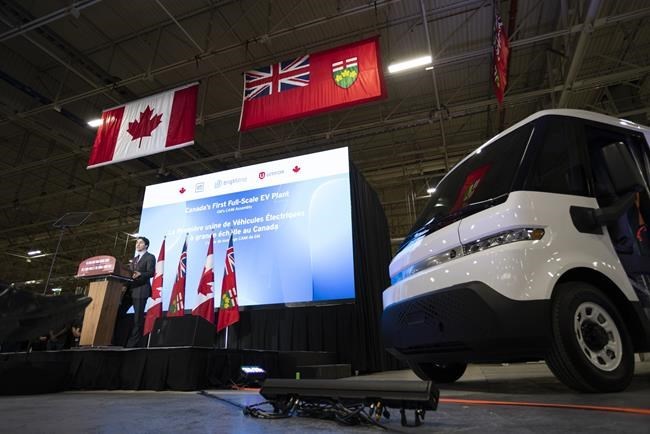OTTAWA ŌĆö One-fifth of all passenger cars, SUVs and trucks sold in sa╣·╝╩┤½├Į in 2026 will need to run on electricity under new regulations Environment Minister Steven Guilbeault proposed Wednesday.
By 2030, the mandate will hit 60 per cent of all sales and by 2035, every passenger vehicle sold in sa╣·╝╩┤½├Į will need to be electric.
Guilbeault's parliamentary secretary Julie Dabrusin said during Wednesday's announcement that the new target is "about making sure that Canadians have access to the vehicles they want."
Manufacturers or importers who don't meet the sales targets could face penalties under the Canadian Environmental Protection Act through a phased-in approach.
sa╣·╝╩┤½├Į still has a long way to go before approaching the first target in 2026.
In the first six months of this year, sales of fully-electric and plug-in hybrid vehicles made up just 7.2 per cent of new car registrations. For all of 2021, the proportion was 5.2 per cent.
Cara Clairman, president and CEO of Plug'n Drive, a non-profit organization that encourages electric vehicle use, said the toughest part of promoting the change from gas-powered vehicles is availability.┬Ā
"Long waiting lists are definitely discouraging consumers that are ready to make the switch," she said. "And if we all agree that we're in a climate emergency, we need to help consumers make the switch as soon as possible."
Brian Kingston, president and CEO of the Canadian Vehicle Manufacturers' Association, said the federal government should be building out necessary infrastructure for electric vehicles before regulating sales.┬Ā
He suggested that sa╣·╝╩┤½├Į's infrastructure is not on track to support a growing fleet ŌĆö and those who will be driving the new cars. "The vehicles are coming, but we need a supercharged effort to help marketing, and actually make that purchase and make it easy, convenient and accessible," he said.
Under the draft regulations, to be formally published Dec. 30, the government proposes tracking the sales by issuing credits for vehicle sales.┬Ā
Fully electric cars and trucks would be worth a bigger credit than plug-in hybrid versions, though the government acknowledges that plug-in hybrids will likely remain in demand in rural and northern areas.
The mandate fulfils a 2021 Liberal election promise. It's the first major set of regulations to come out of an emissions reduction plan the government published in April.
That plan is sa╣·╝╩┤½├Į's broad road map toward hitting its goal to reduce greenhouse gas emissions across all sectors to a level in 2030 that is 40 to 45 per cent below what it was in 2005.
Passenger vehicles account for half of all road transportation emissions and about 10 per cent of sa╣·╝╩┤½├Į's total emissions across all sectors.┬Ā
Before Wednesday's move, sa╣·╝╩┤½├Į already had targets for electric vehicle sales.┬Ā
But they were not enforceable, and the government wasn't successfully compelling car companies to ramp up the number of electric vehicles available for sale.┬Ā
Kingston said the government's approach seems intended to "regulate away global supply chain challenges" ŌĆö but he said that's not realistic, since a whole new supply chain is being created for electric vehicles.┬Ā
"You can't regulate away shortages, and it simply doesn't work like that," he said.┬Ā
The new policy would decouple sa╣·╝╩┤½├Į's regulatory regime from the United States, Kingston warned, and the impending penalties for vehicles sold outside of the prescribed federal targets could raise the overall cost of operating in sa╣·╝╩┤½├Į.┬Ā
Clean Energy sa╣·╝╩┤½├Į, an advocacy group housed at Simon Fraser University, celebrated the announcement in a press release but warned that the penalties will need to be legally enforced, "a time consuming process" that will create complexity and uncertainty.
The group said that other countries have opted to use immediate financial penalties as soon as auto-makers are non-compliant.┬Ā
The new targets will be countrywide, though some provinces are already ahead of others.┬Ā
An analysis on Quebec and British Columbia's mandates released last week by the Canadian Climate Institute concluded that the mandates helped both provinces move well out ahead of the rest of the country on electric-vehicle use.
Anna Kanduth, a senior research associate at the institute, said global supply of zero-emission vehicles is still limited, though it is growing quickly.┬Ā
"Auto manufacturers are largely prioritizing jurisdictions with some type of sales mandate," she wrote, adding that places with mandates have much higher rates of zero-emission vehicle adoption and more model choice
sa╣·╝╩┤½├Į is leading the field in electric-vehicle sales, which account for almost 15 per cent of all new vehicles registered between January and June. Quebec is in second, at 11.4 per cent of registrations.┬Ā
There is a steep drop off to third-place Ontario, where only 5.5 per cent of new registrations are for electric vehicles. The number is below four per cent in all other provinces.
"What happens is that the vehicles are going to those jurisdictions with a sales target," Dabrusin said.┬Ā
"I would encourage any jurisdiction that's looking at how to assist on the affordability piece, and to encourage the purchase of zero-emission vehicles, that they also consider and look at what's happening across our country."
This report by The Canadian Press was first published Dec. 21, 2022.
Mia Rabson, The Canadian Press
Note to readers: This is a corrected story. A previous version said sa╣·╝╩┤½├Į is moving to mandate electric vehicle sales starting in 2025.



